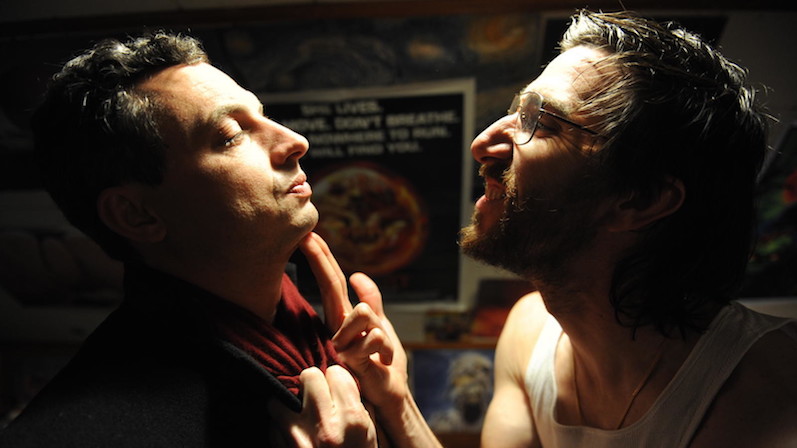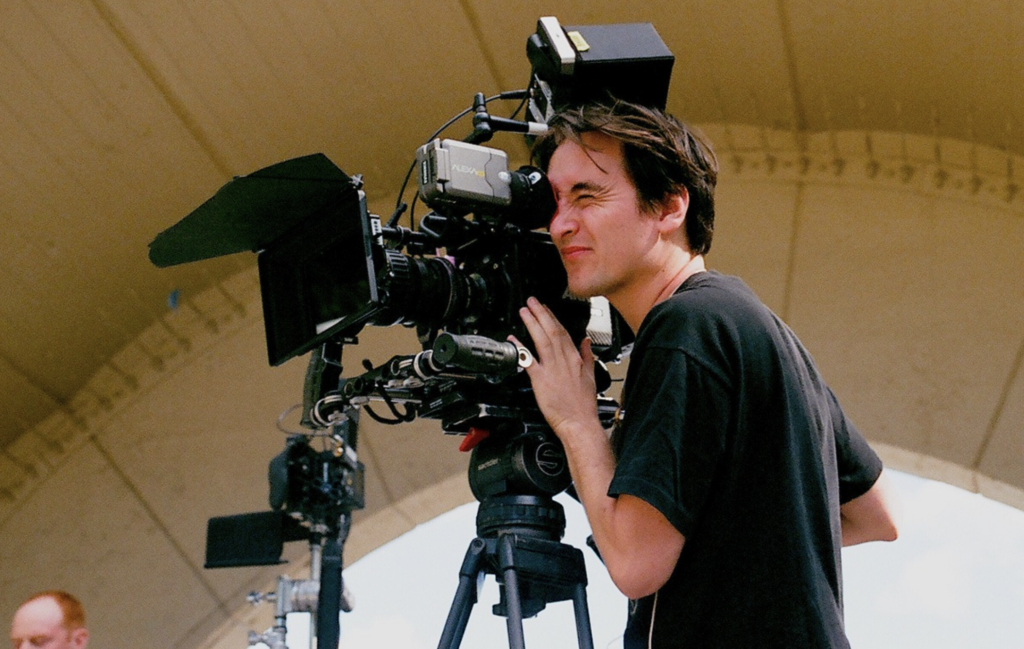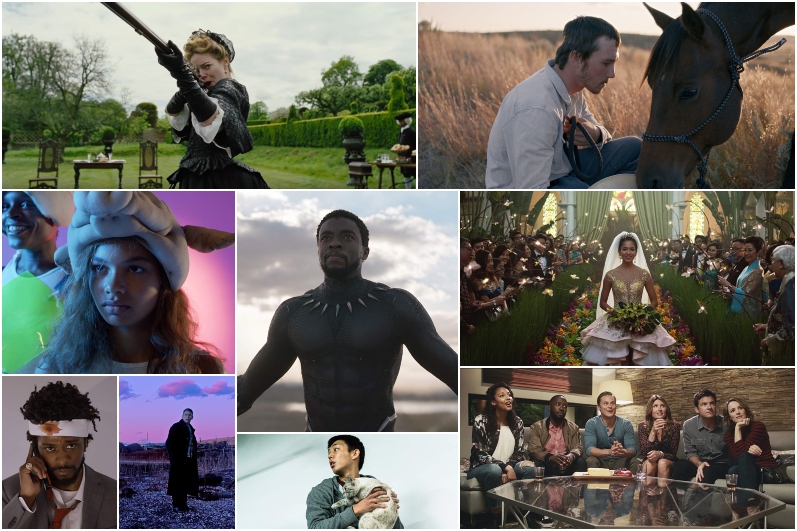For his feature film DONALD CRIED, filmmaker KRIS AVEDISIAN opted for a homecoming of sorts. The movie – which itself revolves around a homecoming – not only filmed in Avedisian’s hometown of Warwick, Rhode Island, but also found him reprising a character he created for his 2012 short film of the same name. Expanding on that short’s story with longtime friends and collaborators JESSE WAKEMAN and Kyle Espeleta, Avedisian wrote, directed, produced, and stars as the oddball character that gives the film its title.
Donald Cried finds Wall Street banker Peter Latang (Wakeman) returning to his working class hometown to bury his grandmother. When Peter loses his wallet and finds himself stranded without a car, he is forced to knock on the door of his former neighbor, childhood friend, and extreme weirdo Donald Treebeck (Avedisian). What starts as a request for a few bucks and a ride turns into a full awkward day of hanging out with Donald, revisiting old haunts, rehashing old times, and navigating Donald’s eccentric personality.
After its premiere at SXSW in 2016, the film was picked up by The Orchard for distribution and also attracted the attention of Rough House Pictures’ David Gordon Green, Jody Hill, Danny McBride, and Brandon James, who signed on to help shepherd the film as Executive Producers. Donald Cried hits select theaters on March 3, 2017. We had a chance to speak with two of the driving forces behind the film, writer/director/star Kris Avedisian and co-story writer/star Jesse Wakeman.
——
COLIN McCORMACK: I wanted to start out talking about your guys’ beginnings as a creative team. It was a lot of short-form online content?
JESSE WAKEMAN: Well, it was pre-online when we were starting to do it.
KRIS AVEDISIAN: Yeah, and then Jesse and Kyle got into some of the online stuff.
JW: Some YouTube stuff, when that started coming out.
KA: But yeah, I moved [to San Francisco] and took some editing classes and made a short. Then Jesse and Kyle through mutual friends got connected, and we were all doing our own stuff. Then we came together and were just figuring out how to make things. Then we all separated, I tried living in New York, [Jesse] was in New York and Kyle was there, and we would get together and make shorts. Because in 2000 or whatever was the Dogme era, Harmony Korine and stuff. So I was shooting more myself and it was this very docu-style way of capturing stuff. So we moved and did these other shorts and were like, Let’s put stuff on sticks and try to get legitimate and feel it out-
JW: Let’s learn how to make movies.
CM: Did you have a thought of where you wanted your career to go? Like, These [shorts] will get us attention, then funding? Were you looking at it in those terms?
JW: That was probably what we were worst at. We didn’t have a plan.
KA: We didn’t have the producer-type [partner]. Jesse was into music, we were all kind of all over the place, but we’d always come together for these [shorts]. And we just never had the business sense. I’m always fighting – even with this movie – there’s always for me this feeling like once I’m done with it and it’s out of my system, I’m done with it. We had made a short feature – that should’ve been a long short – and it was really good. I think people have seen it now and it still holds up. We went to a New York film festival, this scam festival, like, Let’s get legitimate! I’m gonna put $3,000 on my credit card! They scammed me out of $3,000 for money and publicity and putting it into this festival. And it didn’t go anywhere. This festival was awful. So that. And I don’t see myself as a very mature person and I think finally having a kid, once my wife was pregnant it was like, Oh shit. We better start figuring it out.
CM: Viewing it as a career.
KA: Yeah like, How does this become legitimate?
JW: But there were a lot of moments where it could have broken through. We were doing it for a while. When Kyle and I were first doing this YouTube thing, we met with Comedy Central and things started to kind of happen. And then, ehh [hand goes down in a nosedive motion]. We have friends in New York now who have been on the festival circuit for years doing that. And we just never clicked into that. You can make up whatever the narrative is, but we’ve had our time to work in our little bubble. We’ve really been in a bubble, we don’t have a lot of different film friends or [industry] people we’re connected to. It’s just us. And so when we finally got to this [Donald Cried] short, we thought, “Okay that. Those characters. I think we can build on that.”
KA: It was a return to form. The short was a return to form of a style we were doing in 2000, which was the Dogme thing, this docu thing. We’d spent so much time fucking around with more conventional forms-
JW: But we didn’t think of it that way. It was just another short.
KA: Yeah, but it was all a process of making stuff. Jesse and I were working on a particular script to try to make as a micro-budget and that wasn’t going anywhere. And then the process of writing, we ended up spending a lot of time doing that. Like, I understand it, but how do you really write a feature? All this stuff kind of came together.
JW: We started it in 2002 basically.
CM: Did you come up with the character of Donald first and fashion the storyline around him, or you knew you wanted to do this homecoming story and the character came after?
KA: Kyle had the idea to put us together and have me be a weirdo and Jesse be a straight guy.
JW: Kind of this exercise.
KA: He thought it would be a cool idea to stick us in a diner and have us talk and not know each other’s backgrounds.
JW: Kyle was going to tell me one thing, he was going to tell [Kris] something else, and we were just gonna go. That was the original idea.
KA: And that was just kind of a passing idea he had. Then we took it and put it together and decided, Let’s just shoot this short over a weekend. Then that’s where the coming home stuff came in and the idea was just like, Let’s give some context to why these guys meet in the first place. I’m this one-note funny guy, how do we turn it and give the short an arc? And what’s that arc going to be? It’s not going to be so much character arcs, it’s going to be the audience’s arc of their perception of Donald. And that was the piss in the bottle [a childhood story that comes out about Peter bullying Donald]. Then from there, like Jesse said it was dynamic, it was a return to form, like, This is the feature we could do. And people were getting so much out of the short. It was there. It was built in subconsciously- bullying and not returning home and all that stuff. Once the short played and people were bringing up all this stuff, it was like, There’s more of a story to tell. People are getting all this out of this small keyhole view of [the characters].
CM: So these expanded plotlines came after the fact [of making the short]? It wasn’t like, Oh we want to include this but we’ll have to wait until the feature version?
KA: It was a struggle to figure it out. We knew we wanted to retain the 24-hour period, we knew we wanted to retain that it not be so much of a character arc as more of an audience arc. And it was just bouncing back and forth of how much of a Planes, Trains hijinks kind of thing we wanted-
JW: An ‘80s comedy type of thing.
KA: After Hours. Because we have Euro sensibilities, so it was always like we don’t want it just to be this experiential doc or something. Which it could have been a cool version of—
JW: We wanted to pull from that too.
KA: But we wanted the movie to get picked up, we wanted to find an audience, so we knew it had to toe the line. And in that way I think our business mind started to come together. Like, It’s got to look like this if we want to find some success.
JW: It’s all very hard in retrospect because you rewrite the narrative.
CM: You said when you were starting out you didn’t have a big film community or business connections. Did those come into play once the short went on the festival circuit? Were people, potential financiers, coming out of the woodwork?
JW: No! Definitely not. But it was great, we played at Slamdance, we played at the Boston Film Festival, and Rooftop [Films]. Those were little connections. Rooftop has supported us. But I mean, we just really struggled finding a producer. Speaking to young people trying to make movies, that was really hard for us! And now that we’ve done it it’s like, [nonchalant] Oh no, it’s just this, this, and this. But back then it was like, Ugh! What do we do?!
KA: Fox Searchlight had a web division at the beginning of this thing, and they had reached out after the short. What are you up to? What have you got going on? So that was a small hint of it. But even being at Slamdance with the short, I was super depressed because this short isn’t flashy and it’s not like a music video and I’m not a cinematographer so it’s not like building a reel for that. I was just depressed because what does a short really do? I guess you can get an Oscar, but it was frustrating. So it was just like, Yeah, we have to make a feature.
CM: So how did you end up getting connected to producer Kyle Martin?
JW: It was kind of magic. Like the snow coming [an unexpected snow storm on-location]. We went through a couple producers like, Do you guys even know what this is? They did not. And then through some director friends out here [in L.A.], I think I had sent them a list of names of producers-
KA: But we don’t know where you got that from.
JW: I think I got it from my friend Jennifer, who’s an NYU person. And Kyle [Martin] has connections at NYU. He went there. And I think I sent it to Tony Abrams, who made Pumpkin, and he sent that list back from like four years before and said, “I don’t know, have you called these guys again?” It was really like, Who can we ask? Who will listen? It was a great way to connect because we hadn’t even met [Martin] physically and were just like, “Do you want to check out this short, Kyle?” And he watched it and just was like, “This is great. This is what I want to do.” He had come off of Tiny Furniture, and we know Kyle now and it makes sense that he would have done that, but he was really into and was like, “Let’s meet up.” And we got a beer and it started. We connected, [Kris] came down, we met up, and that was probably in the summer before [filming].
CM: Staying on this topic of connections, you were accepted to the IFP Filmmaker Labs mentorship program. Who were some of your mentors during that?
JW: Amy Dotson. Zach Manindach. Those were our folks there who were really great. Charles Poekel was the mentor. He had made Christmas, Again. Cool guy.
KA: There were a lot of people coming in. That was cool. That was what legitimized [and] made the movie feel real. Because Jesse’s always been far more positive than I am, which is nice, but I was kind of [in] a dark hole after the movie was made until [IFP] happened. But that was a great program.
JW: Really helpful.
KA: But the producer thing was a huge missing piece. Because even when [Kyle Martin] came on, we were just like “How is this going to happen?” Oh don’t worry about it, it’s going to come together. You’ll see, in a week it will all come together and we’ll all be here shooting the movie. It just seemed like such a crazy thing. But like Jesse said, we really worked in our own bubble. We knew people who were doing stuff, but we still felt so unreachable at the time.
CM: Was it still a small crew of people you knew and had worked with before, or was Kyle bringing in a lot of people you didn’t know?
KA: It was a small crew, and he brought in [some]. Jesse knew Sam Fleischner, the cinematographer who’s also a director. So we were talking to him, but of course he knew Kyle. And Kyle crewed a couple of other people, and we had a couple people from Rhode Island working on it.
JW: One of Kyle’s best friends did sound, Micah Bloomberg. And he’s a great writer and now he’s involved in our next project. It was a really good group of people that really brought great stuff to it.
KA: It was small. Really small. We knew we wanted it to be small, we wanted to be able to move. I don’t think we ever did this, but to be able to go, If we have a great idea at 10:00 at night, let’s be able to go just shoot it. That type of thing.
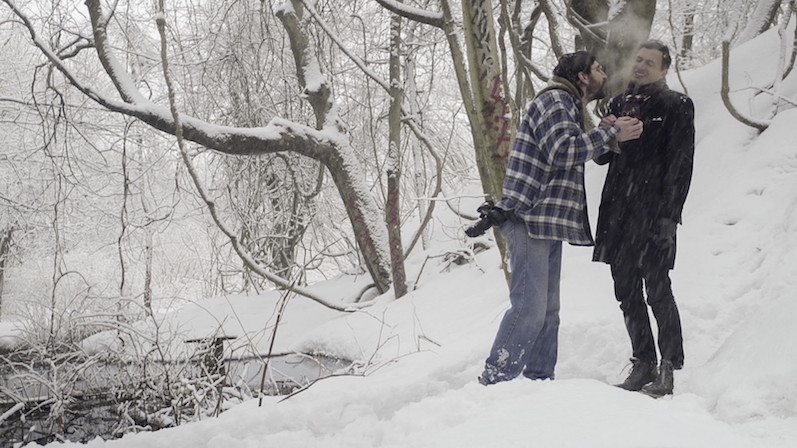
CM: And the location scouting – was it slightly easier because it was your hometown? Connections, getting permissions-
KA: Permission was really easy. We had budgeted a little bit of money to offer these places, but a lot of these places didn’t even think to ask [laughs]. I mean, we weren’t presenting it.
JW: It was so sweet. It was such a part of the movie, these places. The nursing home, the bowling alley.
CM: Even though it takes place over this one day and it’s in this one town, you cover a lot of terrain. It feels like a road movie even though they don’t leave the town. How hard was it to juggle these locations on a limited budget and limited schedule?
KA: Everything’s so close. The place is so small, so it was easy. Everything was like a five-minute drive from our headquarters office.
JW: We don’t have a lot to compare it to. But it was also very tense [laughs]. We shot it in eleven days, so it was like, Hurry up we gotta move on.
KA: But it was all close. So it was like, Oh if we have to catch a shot of the diner, we’ll be driving by it on the way to the bowling alley. That type of thing.
JW: That was nice.
KA: The smoking pot scene was supposed to take place in a fort in the woods – which never really made sense why Donald would be keeping up a fort – and we were just supposed to fuck around. Then Sam, he was from Providence, and he suggested the train tunnel, which I knew about but just never thought that we could go in there. And everyone from Providence knew it was a place you could get into. So that came late in the game and it was amazing because it ends up being this really big setpiece, and it feels great to go into this really strange place. Then Donald’s hideout came and made sense in the train tunnel. That hideout being in the train tunnel brought the gun idea. That came in late. We’d been struggling right up to when we shot, like, Is he going to be scared that I have the gun?
JW: Are they going to be shooting it together for fun?
KA: Yeah, but the story point was, Is [Peter] scared of it? And it was like, No he’s not scared of it. It’s better if he’s in on it.
CM: But the audience doesn’t know.
KA: Yeah, the audience doesn’t know so we’ll play it both ways.
JW: In the creation of the story, Kris would call and be like, “Ugh, I don’t know, I’ve been thinking about it all weekend and I just don’t want Donald to be a teddy bear. He can’t be this nice guy. The audience can’t be comfortable with him. He has to be a threat.” I think that always being there kind of reminding us is what led to that [gun scene].
CM: And the audience’s allegiances shift as well. Because [Jesse’s] character could have been the audience surrogate, the put-upon Ben Stiller in Meet the Parents. Everything’s happening to him, but he’s kind of this nice bland guy. But [to Jesse], your character is kind of a dick as well. Sometimes you’re on his side because you’re annoyed by whatever Donald’s doing, but other times-
JW: He sucks. [Laughs]
CM: Was that part of the writing process from the get-go? You wanted the audience to go back and forth?
KA: Yeah, in the short because it was so much shorter, Jesse felt more like the Ben Stiller character. Like, Oh he’s done something [bad] that any good normal person might have done. He tricked his friend into drinking piss.
JW: We’d get into great conversations after [screening] the short. I remember my wife’s family going back and forth like, “Donald!” “No, Pete!” That same sort of thing happened and that’s such a big part of the movie.
KA: Doing the feature, it was figuring out what [Peter] was going to be and not wanting him to be the Ben Stiller guy. But we also wanted him to be open to interpretation. Someone just asked us a question no one’s ever asked us before which is, Which one would you rather hang out with, Donald or Peter? And we both said, “Peter.” And then it was like, “Donald.” And the whole part of the story is that they both are kind of the same, and painful in their own ways. And they’re both dealing with similar thing that are affecting them.
CM: Do you get asked a lot about whether there was a lot of improv?
JW: We get asked that a lot.
KA: Yeah.
CM: What about not in terms of scripted lines or jokes, any other on-the-fly decisions? You said the tunnel scene came along [late], but any other stories of having to problem-solve at the last minute?
KA: We re-shot the beginning. Donald came out-
JW: Before [Peter] got into his house.
KA: That was kind of a last minute thing. We were doing re-shoots and restructured the beginning to have Donald stay away and [Peter] come over to his house. We always had him coming back to Donald’s house [later], but it just made sense to hold Donald off, not know who he is, have him looking out the window at this house. So that was a last minute adjust to what we thought we had and what the story was looking like.
JW: That’s the benefit of having worked together for so long. We could be confident that if something happened we could adjust and find it. We were talking about it in another [interview], we believe in the beauty that chance allows. There are moments like that. I mean, Kris really got his nuts stuck on that vine going down. You just can’t plan for that– the way that ended up playing out. Those kinds of things we just love. That’s the fun of watching movies.
KA: The bathroom scene. It’s so small and insignificant, but after I got roughed up, that [scene] wasn’t there. We had some extra time and it was like, It’s going to feel weird. We need one beat that happens before we go outside walking. So that was a last minute feeling that we might need it.
CM: And when you already have the free location-
KA: Yeah, we had the location. It was one of those little things. I feel like if that wasn’t there, it gives you just fifteen seconds to digest what happened in the office without them going right into talking about it. Just a small little thing.
CM: Finally, I wanted to ask about how the Rough House Pictures guys came on-board. They saw it at a festival and then signed on?
KA: David Gordon Green got [a screener] through a mutual friend and just really responded to it. I had met him when he was in Boston shooting Stronger right after SXSW. We met and they just wanted to support us.
JW: They’ve been amazing.
CM: Was picture locked when they saw it?
JW: Oh yeah, it was at SXSW.
CM: So they’re championing your film. Their first breakout [The Foot Fist Way] was championed by Will Ferrell and Adam McKay. So you guys have to complete the cycle and find some young filmmakers to champion.
KA: [Laughs] When I saw that movie and saw Will Ferrell was part of it back when that came out, I was like, Wait, how does Will Ferrell get involved? Do they send it to him? How does that fucking happen?
JW: We’ll have to ask Jody.
KA: So I’ve thought about that, we’ve gone full circle. And we’re working on a TV series that completely had to be changed because of everything they covered in Eastbound & Down. We thought it was going to be suburban movie with waterslide parks and pools, and even Danny McBride’s character and his trajectory. We kind of had to alter this whole thing, which was for the better.
CM: That’s what you’re working on now? A TV project?
JW: A TV project. And there’s a film project.
KA: Hopefully something will stick.
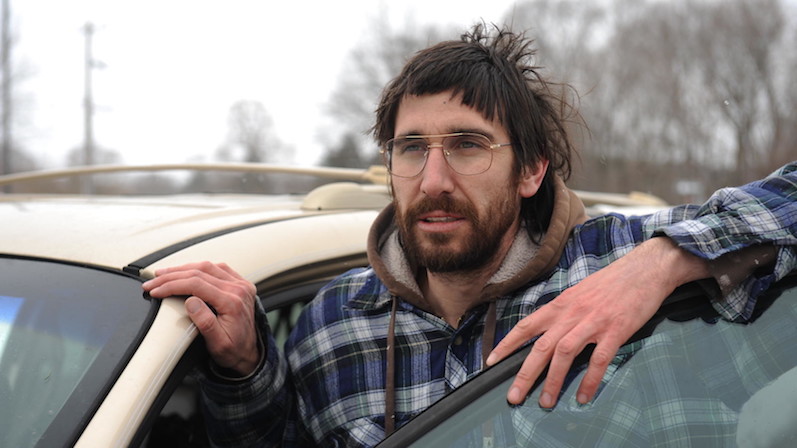
__
Thanks again to Kris and Jesse for chatting with us about DONALD CRIED. Follow the film on Twitter, Facebook, or Instagram.
If you’re an independent filmmaker or know of an independent film-related topic we should write about, email blogadmin@sagindie.org for consideration.

